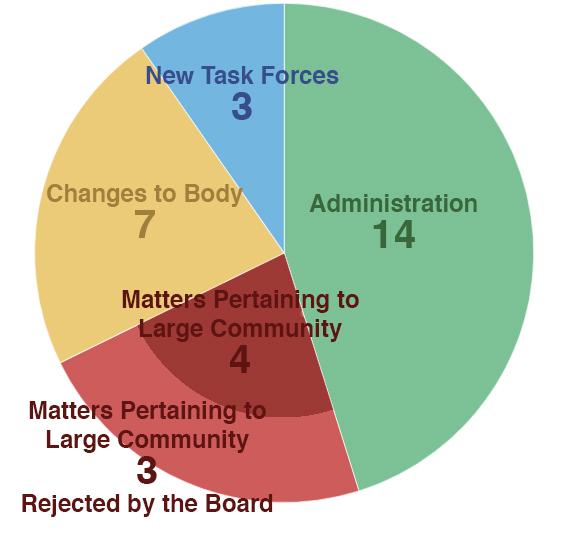You know how graduation is held at Yankee Stadium every year? Well, that’s decided by the University Senate — a 137-person body made up of students, faculty and administrators with the ability to change university-wide policies — that is, if its proposals are approved by the Board of Trustees. Despite the scope of its jurisdiction, the most common resolution passed in the University Senate is choosing the site of graduation.
Multiple students, when asked, were not even aware of the University Senate’s function, or even its existence.
“I don’t know any resolutions that have been passed,” Tisch first-year John Mills said. “I didn’t know there was a University Senate. Maybe I’m ignorant, or maybe this is a general sample.”
“The University Center?” CAS senior Matthew Henry Huo said. “I feel like a lot of NYU students don’t know this. What is the University Senate?”
“We’re so not knowledgeable,” CAS senior Moses Freih said. “But this sounds spicy.”
When asked if she had heard of the University Senate, Tisch sophomore Cameron Franklin simply shook her head.
“I didn’t know we had a University Senate,” Steinhardt first-year Grace Park said.
“Yeah, what’s that?” Park’s friend, CAS first-year Mari Lee, asked.
Deciding where graduation will be held and approving scheduling for the academic year and the body’s own meetings make up 14 of the 31 resolutions passed in the last eight years.
“Senate often considers resolutions dealing with policies and regulations,” Chair of the University Senate’s Tenure Track Senators Council Wen Ling wrote in an email to WSN.
Despite this, Ling does not feel that there are restrictions on what a resolution can or cannot propose.
“Based on my experience serving more than 10 years at the University Senate, I do not see ‘limitations’ set for resolutions [coming] before the Senate,” Ling wrote.
Seven resolutions relate to the University Senate itself, from adding representation for non-tenure track faculty to changing the bylaws in hopes of facilitating communication with the Board of Trustees.
Out of the 31 resolutions, seven more include changes pertaining to the university as a whole. The most recent resolution passed changed grade point averages to be defined by three decimal point values, increasing the numerical value of minus grades and decreasing the same for plus grades.
Over the past eight years, three resolutions resulted in the creation of two task forces on sexual misconduct and work-life services. In 2014, an ad-hoc committee to review policies and procedures related to Sexual Misconduct, Relationship Violence and Stalking was created. One year later, a resolution to create another committee that explored NYU’s Work-Life Services, which included services related to childcare, benefits and adaptation, was passed.
This past July, a three-part resolution that would have added student and faculty representation to the Board of Trustees was struck down by the Board itself after passing in the University Senate.
Ling feels the University Senate serves the necessary function of advising the Board on relevant policies and provides a place for frank discussion of issues facing the university.
“I think the Senate works. It’s clear in structure and it represents faculty through two groups,” Ling said. “It [also] represents students. This kind of structure allows us to have open dialogue and it’s all public record so you can see what we say.”
Senator at-Large for Sustainability Edin Thornton is a student in Wagner Graduate School of Public Service and a member of the University Senate. Thornton said the body should deliberate on important issues within NYU.
“The University Senate is responsible for addressing substantive concerns of the University community as they come up through the various representative councils,” Thornton wrote in an email to WSN.
Thornton said although the system of the University Senate can be confusing, the body is efficient and provides insight into the politics and functions of the university.
“I have been very impressed with my experience on the Sustainability Advisory Group,” Thornton wrote. “The groups’ most recent reports reflect the high-quality, ambitious outcomes which are possible as a result of collaborative thought which brings together individuals on many levels of the university.”
While some students seem unaware of the existence of the University Senate, NYU spokesperson John Beckman maintained that student concerns influence university policies, even if it’s not explicitly through resolutions passed by University Senate. Beckman said student concerns have propelled university efforts to increase the minimum wage for students, make changes to university affordability and a campus-wide ban on Coca-Cola in 2005 because of its involvement with labor practices in Latin America.
“I think it is evident that student concerns have a considerable impact on University policies,” Beckman said in a statement to WSN.
Methodology: WSN’s News Team looked through all University Senate minutes that were publicly available on its website to identify resolutions that were proposed and passed by University Senate since Oct. 6, 2011, which are the oldest records available online. If there was not an explicit communication from the Board of Trustees rejecting a resolution, it was assumed that the resolution was approved by the board. The data also does not include resolutions that temporarily suspended the rules of the University Senate in order to allow a vote to take place. Over the last eight years, this has happened two times.
A version of this article appeared in the Monday, March 4, 2019, print edition. Email Mansee Khurana and Victor Porcelli at [email protected]
























































































































































